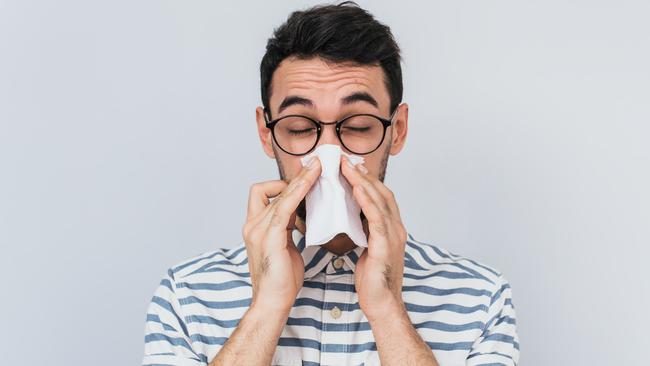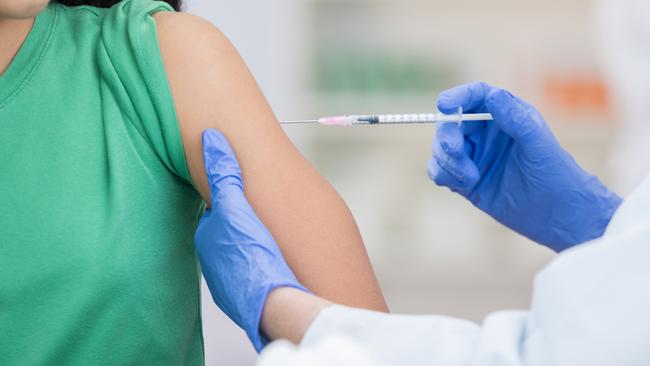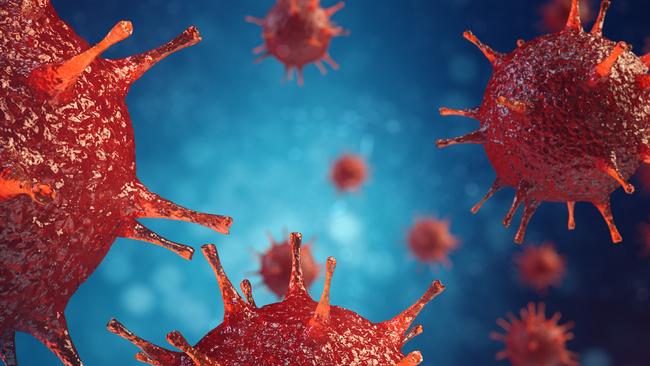2019 flu update: What you need to know
Autumn is here and so is a new annual flu vaccine. But do you really need a jab? Dr Nespolon answers everything you need to know about the flu vaccine including knowing your risk, why timing is everything thing and who shouldn’t get the flu vaccine.
Body+Soul Daily
Don't miss out on the headlines from Body+Soul Daily. Followed categories will be added to My News.
Prevention is as close as it gets to a cure when it comes to the flu. Taking action with the new 2019 vaccine is your best chance of avoiding it this winter.

Autumn is here and so is a new annual flu vaccine.
But do you really need a jab? Yes, definitely, according to the experts, who are offering six million Australians free influenza immunisations this year.
It’s part of an Australian Government Department of Health push to lessen the spread of flu, which has had devastating effects on the community in recent years.
In 2017, one of the worst recent seasons, 1255 people died as a result of the virus, according to the Australian Bureau of Statistics.
GP Dr Harry Nespolon, the president of the Royal Australian College of General Practitioners, believes it’s vital to get immunised.
“Because 2017 was a terrible flu season, in 2018 everyone was scared and rushed off for flu shots and we had a relatively mild season [less than 100 deaths were reported],” he says.
“It’s hard to know whether the flu vaccine was a significant contributor to that figure last year or whether it was always going to be a mild season, but there’s no point in taking a chance.
Australia is at the end of the global flu season, so by this stage immunisations are usually pretty good.”

WHAT’S NEW?
According to the Health Department, the latest vaccine contains four different strains of influenza virus, including “a new A strain [H3N2] and a new strain for the B Victoria lineage”. While most of us probably don’t get the technical jargon, what that means is that the vaccine has been updated based on what the rest of the world has experienced so far this flu season.
The annually updated formulation is determined by the Australian Influenza Vaccine Committee and Therapeutic Goods Administration, using information from the World Health Organization (WHO) from October.
Development time means the newest version doesn’t take into account the WHO’s latest advice from February or the severity of the recent northern winter (a relatively mild season with mostly influenza A cases).

KNOW YOUR RISK
Whatever strains are going around, a vaccine is your best line of defence.
“Antibiotics don’t work on flu and we don’t have good antivirals for treating it,” says Dr Nespolon. “The more people who become immunised, the less likely we are to have a lot of people become sick because there are benefits to herd immunity.” Seasonal influenza is an acute respiratory infection that can last anywhere from two to six weeks and leave you vulnerable to significant secondary infections that, at their worst, can lead to death. So when deciding whether to be vaccinated or not, you need to consider whether you’re at normal or increased risk.
“Pregnant women, children under five and people over 65 are particularly vulnerable groups,” Dr Nespolon says. According to the ABS, in 2017, more than 1000 of the 1255 deaths from influenza were in the 65-plus age group.
“There were a lot of pregnant women with flu in intensive-care units around Australia, as well as children who ended up in hospital.
That’s why the government provides free flu vaccinations for those in high-risk groups.” In addition to the groups mentioned above, the free National Immunisation Program is also open to anyone with a chronic health condition and all Aboriginal and Torres Strait Islanders from six months old.
See your GP or pharmacist to find out if you’re eligible. If not, you can pay about $20 for a flu vaccination at your GP or pharmacy. Many employers also offer onsite discounted or free vaccine programs.
“In the past we’ve had problems with supply, but that doesn’t seem to be a problem this year,” Dr Nespolon says.

TIMING IS EVERYTHING
Current advice about when to have your vaccination differs from previous years, when earlier was thought to be better.
“For the best chance of not getting flu, leave it until the end of April because the vaccine tends to wear off after three to four months,” Dr Nespolon advises, adding that “research shows most flu cases occur between June and September”. To be protected by June - and be covered during the August peak - have your jab by mid-May because it can take a few weeks to build immunity.
While it’s true that your post-vaccination immunity can decrease after a couple of months and responses are highly individual, Dr Nespolon says it can lessen the severity of a bout of influenza if you still get sick.
This is confirmed by the government’s Influenza Surveillance Report from 2018, which said people who were vaccinated were 68 per cent less likely to present to a GP and 66 per cent less likely to be hospitalised due to flu, compared to those who weren’t vaccinated.
Being consistent in having your annual flu jab may also be beneficial. “Even though the virus changes every year, there’s still crossover year to year, so if you’re having regular vaccinations, you’ll build up immunity to a range of different flu viruses,” Dr Nespolon says. “Flu is very real and flu vaccines save lives.”

FLU Q&A
Dr Nespolon answers everything you need to know about the flu vaccine ...
HOW LONG DOES THE VACCINE PROTECT ME FOR?
It’s thought to give you maximum protection for about three to four months. But remember, vaccination won’t stop you from getting a cold or a different virus, and no vaccination is 100 per cent effective.
ARE THERE ANY JABS I CAN’T HAVE AT THE SAME TIME?
Not generally, but it’s still a good idea to check with your GP.
WHY DOES IT TAKE AS LONG AS TWO WEEKS TO TAKE EFFECT?
The vaccination works by exposing your body to a group of antigens it hasn’t been exposed to before.
That requires your immune system to develop antibodies to those antigens, which takes a couple of weeks. The dose is not enough to make you sick, but it’s enough to trigger an immune response
MY KIDS AREN’T WELL, SHOULD I WAIT UNTIL THEY’RE BETTER TO BE VACCINATED?
Fever is the only contraindication in children, so you may want to delay it, but not if they just have a runny nose.
I’M VEGAN, CAN I HAVE THE FLU VACCINE?
The main vaccine is bred in eggs.
While a non-egg-based vaccine is available this year, it offers slightly different flu coverage to the standard versions. The traditional vaccine is not thought to be a problem for someone with an egg allergy. Talk this through with your GP to discuss your options.
ARE THERE ANY SIDE EFFECTS I SHOULD WORRY ABOUT?
The most common side effect is a sore arm, so be aware of that if you’re playing sport the next day.
Sometimes you may see a mild flu-like illness 24 to 48 hours after the injection, but that’s pretty uncommon. If this happens, it’s not because you have the flu, it’s your body’s immune reaction - it’s doing what it’s supposed to do.
CAN EVERYONE BE IMMUNISED?
There are contraindications for anyone with the autoimmune disease Guillain-Barre syndrome. If you have a different autoimmune condition, talk to your GP. But generally, if you do have a significant health problem it means you probably should have a flu shot.
I HAD THE FLU IN MARCH. AM I IMMUNE OR DO I STILL NEED TO HAVE THE VACCINE?
Yes. Because it can be difficult to get the right diagnosis, you may not have had influenza. And even if you did have an influenza virus then, there are a variety of different strains, so there’s no guarantee you may not get another subtype.
I’M TRAVELLING TO EUROPE IN EARLY 2020, DO I NEED A JAB BEFORE MY TRIP?
Our 2019 vaccination is probably not going to be the same as the Europe or US 2020 vaccinations. If you’re particularly susceptible or going to be away for more than a month, think about getting the vaccination for that area when you arrive as you won’t be able to get it in Australia.
DID YOU KNOW?
You can carry the flu virus and have no symptoms. According to Harvard Medical School, 20-30 per cent of people carrying the virus are symptom-free. Carriers can also pass on the virus just by breathing.


